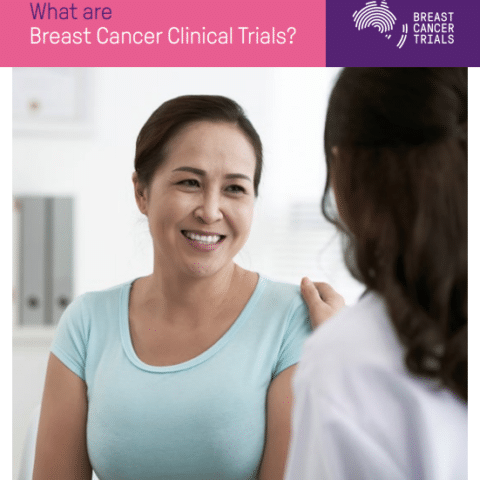- Research
- 2022-2026 Research Strategy
- Open Clinical Trials
- Closed Clinical Trials
- What is a Clinical Trial?
- Why Participate in a Clinical Trial
- Remote Telehealth Pre-Screening Process
- Research Achievements
- Publications
- Research Development and Funding
- Participating Institutions
- International Collaboration
- BCT Trials & Projects Summary
- Translational Research
- Clinical Fellowship Program
- International Fellowship Support
- Annual Scientific Meeting
- Travel Grants and Awards
- About
- Our Impact
- Fundraise
- Donate
- Researcher Login
- Cart
WHY SHOULD I PARTICIPATE IN A BREAST CANCER CLINICAL TRIAL?
While new treatments are tested extensively in the lab, they need to be tested in humans to ensure they work in the patient group they are intended for. Trial participants help researchers and doctors understand more about how the new treatment works, if it is more effective than the current available treatment and to determine the correct dosage of the new treatment.
Clinical trial participants are an essential part of the clinical trials process. Without willing volunteers, we could have no new treatments or prevention strategies for breast cancer.
THE BENEFITS OF PARTICIPATING IN A CLINICAL TRIAL
There are many different reasons people choose to take part in a clinical trial, including:
- Being able to access a new treatment, or drug before it is routinely available as a standard treatment for all breast cancer patients;
- You may access a new drug or treatment at no cost while on the clinical trial;
- The treatments offered on a clinical trial include the best current standard treatment, compared with a new treatment which earlier research shows may be better;
- By participating in a clinical trial, you are helping to advance medical knowledge and your participation may help to improve treatments and outcomes for future women diagnosed with breast cancer or who are at risk.
Clinical trial participants may also be monitored more closely than patients who are receiving the standard treatment, and their treatment is rigorously documented. There are usually questionaries to complete regarding the participants or feelings towards the treatment being trialled. This careful follow-up means that the outcomes of the clinical trial are the result of accurate and detailed information which is then published in peer reviewed scientific journals.


